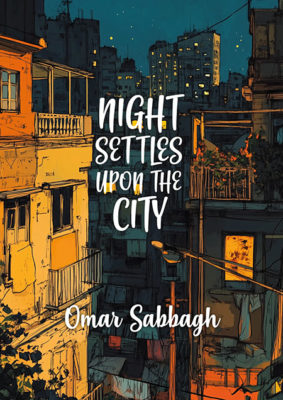Alumnus Omar Sabbagh publishes Night Settles upon the City
‘Dear Diary,’ writes Exeter alumnus Omar Sabbagh (1999, PPE) in the final stanza of his new poem, ‘War Diary’ (which can be read below). He goes on to ask his diary, or perhaps the reader, to ‘listen…log and gauge…be a refuge…be a place made sure’. Writing from Beirut, Sabbagh’s ‘War Diary’ is his way of documenting Israel’s attacks on Lebanon, ‘to make objective what is subjective and thereby control it and ease and quiet the anxiety that way’. The poem is part of his latest collection, Night Settles Upon the City, which acts, according to Fiona Sampson MBE FRSL, as a ‘book of witness to what cannot happen, and yet does’.
Sabbagh describes the book as a ‘war diary in verse’. It comes after his 2023 collection, Cedar: Scenes from Lebanese Life, which he described as a ‘verse-documentary’ of modern Lebanese life. Across his oeuvre, which includes more poetry collections, features in literary publications, and novellas, Sabbagh has used literature as a way of making concrete the anxieties, desires, and experiences of his life, whether that’s his time at Exeter College, documented in ‘Twenty Years in the Making’, or, more troublingly, the current situation in Lebanon. The documentation of war has never been more important: on the 25th of October the BBC reported on an Israeli airstrike on a building known by all official parties to be housing reporters. Three employees of the broadcasters Al-Manar TV and Al Mayadeen TV were killed. In targeting those hoping to document the crisis, the airstrike clarifies the heightened importance of keeping track.
The written word is the medium through which the West can engage with the Middle East, bridging a geographical gap. In Fiona Sampson’s endorsement of Night Settles, she writes that Sabbagh ‘has long brought us a world in which personal experience stitches a hyphen between the eastern Mediterranean and the northerly British archipelago— [he] makes the tension inherent within that richness explicit’. This idea of making tension explicitly ties in with Sabbagh’s wish that his poetry make the subjective objective, and ‘log and gauge’ the conflict. Night Settles echoes this gap structurally. It is divided into two sections of war poetry, bridged in the middle by an interlude of ‘family, familial grief, and celebrations’. Family, and the bonds that tie us together, is also the bond that bridges one half of the collection to the other. Global disconnects are connected by humanity as it is experienced universally. As George Szirtes FRSL writes, it is ‘humanity being human. Reading it is relief and hope’.
However, as Sabbagh makes clear in ‘War Diary’, the images of poetry ‘gift…rest, // if not repose’. Poetry’s ability to make any impact on the tragedies of war is fragile at best, with any ‘rest’ granted followed shortly by a qualifying statement: Sabbagh chooses to place ‘rest’ beside a gap between stanzas that feels like a cliff’s edge. The fragility of life during war is testified to throughout the collection in Sabbagh’s own description of how it ‘teeters on the edge of formalism’. Rhyme and half-rhyme are used in many of the poems, however, its regularity is often disrupted. Certain lines rhyme with one another yet there is no discernible pattern. Where the first stanza of ‘War Diary’ is reasonably structured, with a (loose) ABABCC rhyme scheme, the second stanza doesn’t adhere to this at all. As the rhyme fades away, so does the text, especially in the final lines, ‘a little bit, / a little bit, anyway…’. It is only when Sabbagh invokes the diary that the rhyme comes back, with the lines ‘because history is here, right here—yes, no— / the vicious quid pro quos’ finalising the poem. Despite the uncertainty expressed in the italicised ‘yes, no’ these lines suggest, through the certainty of the rhyme, a formal recouping of poetry’s ability to make and solidify history.
Night Settles ‘aims … to last in its significance and resonance at a time when the world as a whole (let alone Lebanon herself) has become so unpredictable, so fickle, and so perilous’. Gilbert Achar, a Lebanese Professor at SOAS, writes that ‘the Arabic term for poet means the one who feels’. In contrast to what he describes as the ‘Israeli war machine’, Achar points out that it is through poetry that Sabbagh can begin to express the fears and hopes of a city under attack. His collection is a letter, not to his diary, but to readers across the world, in which he logs the experience of war, and sends his ‘best wishes from a wounded Beirut’.
Night Settles Upon the City will be released by Daraja Press on the 1st November 2024. It can be ordered here: Night Settles Upon The City – DarajaPress.
You can watch an interview with Omar Sabbagh discussing the book and reading some of the poems here. One of the poems from the collection is reproduced below, with kind permission.
War Diary
Beirut
Words on paper, tall green blades
swaying on a prairie, billowed by
a heartening wind; spilled language, a great lake
calming a thickset mind, quieting the eye
that looks upon it, steadier and steadier for it.
These are the images that gift me rest,
if not repose. We are resigned here
to face a faceless enemy, gripped and braced
by a faceless fear. But then,
they tell me that words
placed upon a paper might just solve the absurd
price that’s paid each day here, a little bit,
a little bit, anyway…
Dear Diary,
listen to the bleeding of the artless art,
log and gauge the terrors of our times,
be a refuge for the homeless.
Be a place made sure by shoring pillows,
because history is here, right here – yes, no –
the vicious quid pro quos.

